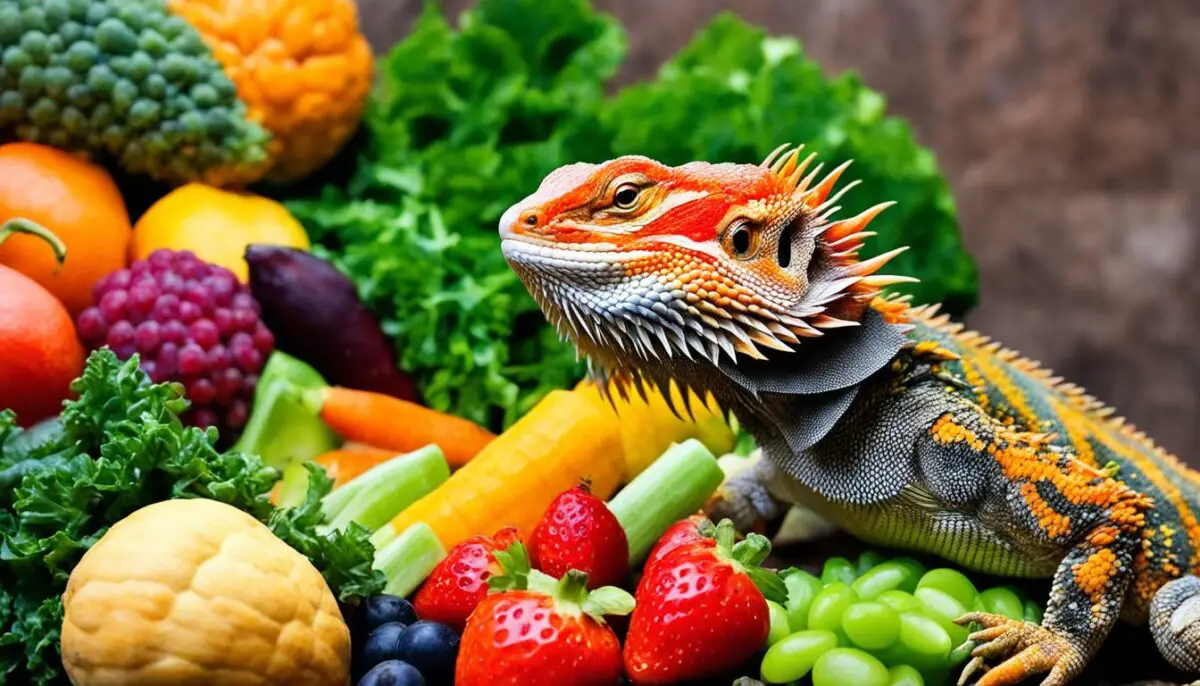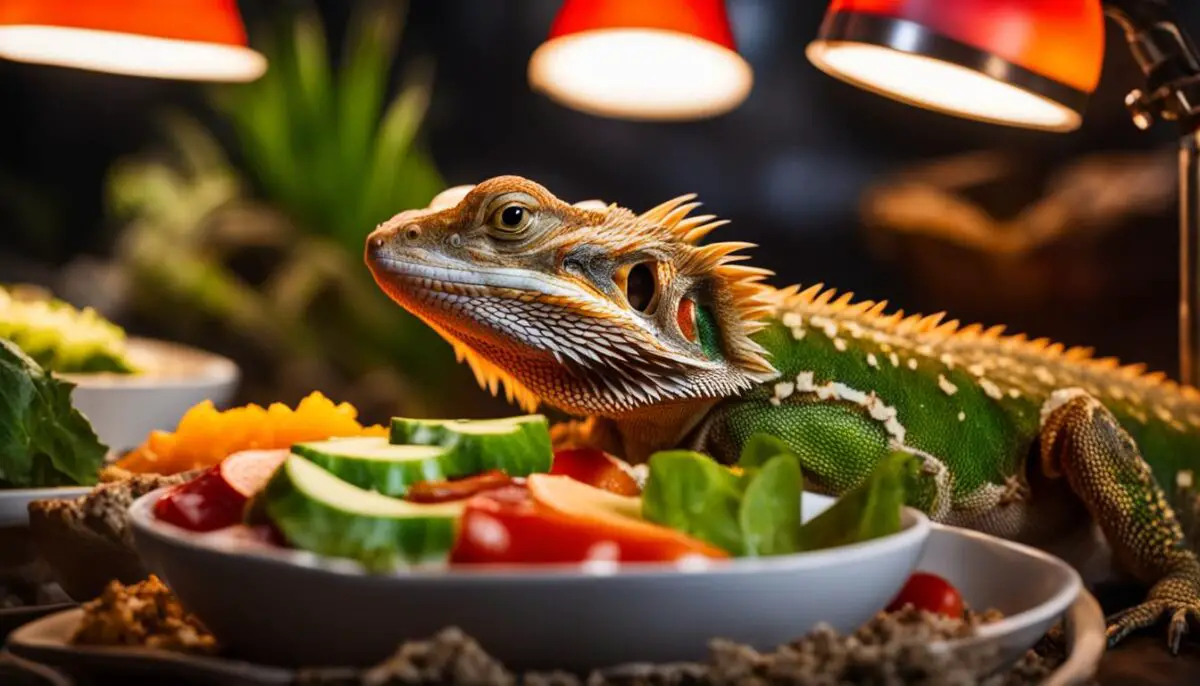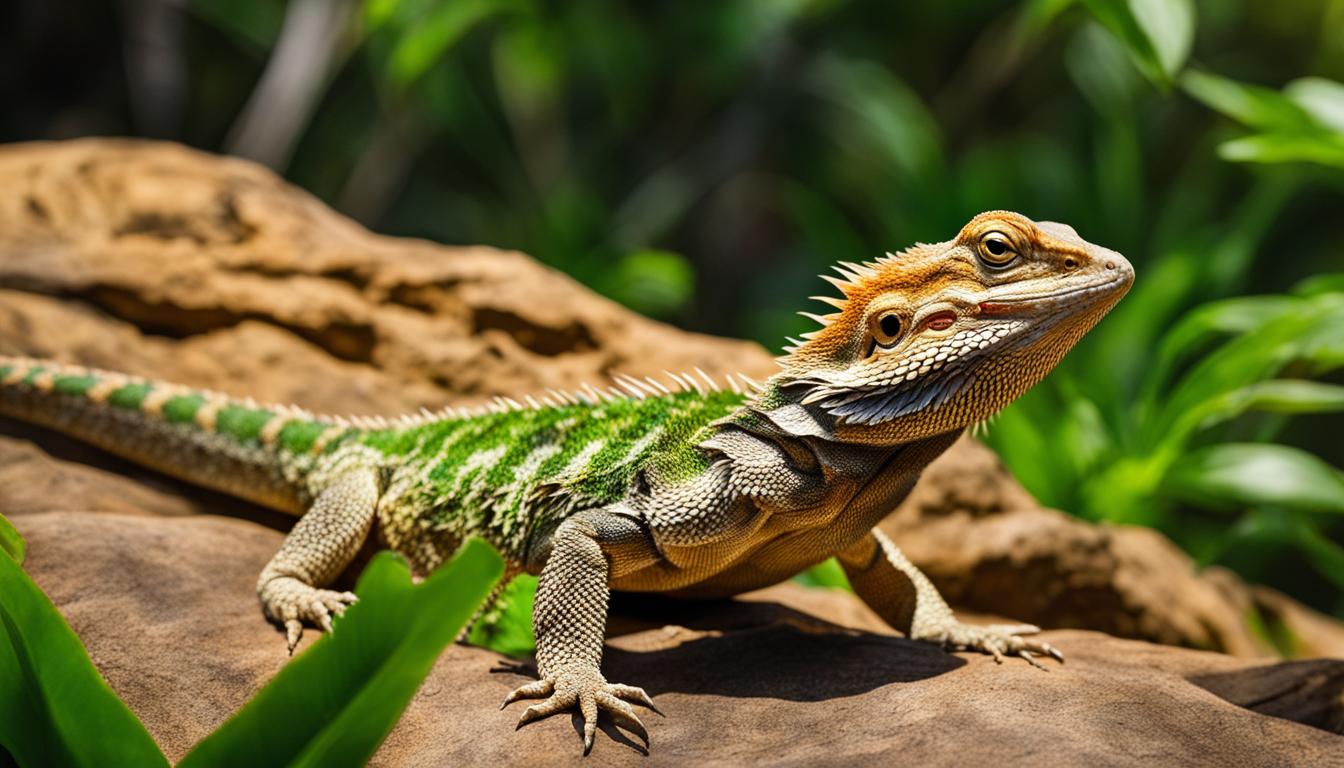Bearded dragons are popular pets known for their docile nature and curious personalities. If you’re considering bringing one into your home in Australia, it’s essential to understand their care requirements and habitat needs. Providing a suitable environment and proper nutrition is crucial for ensuring their health and well-being.
Key Takeaways:
- Bearded dragons are docile and curious pets that can live for 6-10 years with proper care.
- An optimal habitat includes a spacious enclosure, appropriate substrates, climbing surfaces, and hiding spots for thermoregulation and security.
- Maintaining proper temperatures and humidity levels in the enclosure is essential for bearded dragons.
- They have an omnivorous diet consisting of insects and vegetables, with specific nutritional requirements at different life stages.
- Regular health checks by a reptile veterinarian are recommended to ensure their overall well-being.
Bearded Dragon Diet and Feeding
Bearded dragons, like most reptiles, have specific dietary needs that require a diverse and balanced approach. Providing them with a nutritious and varied diet is essential for their overall health and well-being.
Bearded dragons are omnivorous, meaning they eat both insects and plant matter. Their diet should consist of a combination of feeder insects and vegetables to ensure they receive the necessary nutrients.
The Importance of Feeder Insects
Feeder insects are a crucial component of a bearded dragon’s diet. They provide essential proteins and fats that help with growth, development, and energy. Some commonly recommended feeder insects for bearded dragons include:
- Crickets
- Roaches
- Silkworms
It’s important to gut-load the feeder insects before offering them to your bearded dragon. Gut-loading involves feeding the insects a nutritious diet a day or two before feeding them to your reptile. This ensures that the insects are packed with essential nutrients that will be passed on to your dragon.
Adding Vegetables to the Diet
In addition to insects, a bearded dragon’s diet should include a variety of vegetables. These provide important vitamins, minerals, and fiber necessary for their digestive health. Some suitable vegetables for bearded dragons include:
- Dandelion greens
- Endive
- Romaine lettuce
It’s important to offer a mix of leafy greens and vegetables to provide a well-rounded diet.
Proportion Guidelines
The proportions of insects to vegetables vary depending on the age and size of your bearded dragon:
| Age | Insects | Vegetables |
|---|---|---|
| Juvenile | About 70% | About 30% |
| Adult | About 30% | About 70% |
As your bearded dragon grows, the proportion of vegetables should increase, while the proportion of insects decreases.
Supplementing with Calcium
Bearded dragons require calcium to support their bone health. Dusting the feeder insects with a calcium powder a few times a week before feeding them to your dragon helps ensure they receive adequate calcium. However, be sure to use a calcium powder that does not contain Vitamin D or phosphorus, as these can be harmful in excess.
Hydration and Water
Like all living creatures, bearded dragons need access to fresh water. Provide them with a shallow bowl of water in their enclosure at all times. This helps prevent dehydration and allows for occasional soaking, which aids in shedding.
Remember to clean the water bowl regularly and refill it with clean water to ensure your dragon stays hydrated.

Image: A bearded dragon enjoying a nutritious meal of feeder insects and vegetables
Bearded Dragon Health and Care
Bearded dragons are generally hardy reptiles, but they can be susceptible to various health issues. Regular monitoring of their health is important to ensure their well-being. Look for signs of infection, skin sheds, ulcers, or changes in appetite, as these can indicate potential health problems. To maintain their optimal health, it is crucial to provide them with proper nutrition and a clean living environment.
Signs of Good Health in Bearded Dragons
- Bright and alert
- Active and curious
- Consistent eating habits
- Clear and alert eyes
- Shiny and smooth skin
Regular visits to a reptile veterinarian are highly recommended for check-ups and guidance on proper care. This ensures any potential issues are detected early and appropriate treatment can be provided. When taking your bearded dragon to the veterinarian, it’s important to transport them in a secure and well-ventilated container to ensure their safety.
Common Health Concerns
While bearded dragons are resilient, they are still prone to certain health conditions. Some common health concerns include:
- Metabolic Bone Disease: This condition occurs due to calcium and vitamin D3 deficiency, leading to weakened bones and other skeletal issues.
- Parasites: Internal and external parasites, such as mites and worms, can pose a threat to your bearded dragon’s health if left untreated.
- Respiratory Infections: Bearded dragons can develop respiratory infections, especially when kept in environments with improper humidity levels or poor ventilation.
- Digestive Issues: Impactions and gastrointestinal disorders can occur if bearded dragons ingest inappropriate food items or substrates.
Regularly cleaning their enclosure and providing a balanced diet are essential for preventing these health issues. Additionally, maintaining proper temperature and humidity levels, as well as ensuring adequate lighting, promotes overall well-being.

Expert Quote:
“Regular veterinary check-ups are crucial for ensuring the health and longevity of your bearded dragon. A trained reptile veterinarian can provide valuable guidance on diet, husbandry, and preventative care to keep your pet in optimal condition.”
By prioritizing bearded dragon health and seeking veterinary care when needed, you can ensure that your beloved reptile companion enjoys a long and healthy life.
Bearded Dragon Licensing and Legal Requirements
In Australia, all reptiles, including bearded dragons, are protected by law. To legally house a bearded dragon, it is necessary to obtain a Companion Animal Keeper Licence. However, the specific regulations and requirements for licensing may vary depending on the state or territory. It is important to research and follow the rules set by the local government to ensure compliance.
Applying for a licence is typically done through an online process or by contacting the appropriate authorities for more information. By obtaining a bearded dragon licence, you demonstrate your commitment to responsible pet ownership and contribute to the conservation efforts of these fascinating reptiles.
Benefits of Bearded Dragon Licensing
Having a bearded dragon licence comes with several advantages:
- Legal Compliance: By obtaining the required licence, you ensure that you are abiding by local laws and regulations, avoiding any legal repercussions.
- Animal Welfare: The licensing process ensures that pet owners are educated about the specific needs and requirements of bearded dragons, promoting their well-being and quality of life.
- Conservation Efforts: By supporting licensing requirements, you contribute to the protection and preservation of bearded dragons in their natural habitat.
“Obtaining a bearded dragon licence demonstrates your commitment to responsible pet ownership and contributes to the conservation efforts of these fascinating reptiles.”
Remember, the licensing process may involve providing information about the size and condition of the enclosure, the source of the bearded dragon, and your understanding of their care needs. It is important to be prepared and knowledgeable about the specific requirements set by your local government.
Here is an overview of the licensing process in Australia by state:
| State | Licensing Authority | Contact Information |
|---|---|---|
| New South Wales | Office of the Local Land Services | Website: https://www.lls.nsw.gov.au/ |
| Victoria | Department of Environment, Land, Water and Planning | Website: https://www.delwp.vic.gov.au/ |
| Queensland | Department of Agriculture and Fisheries | Website: https://www.daf.qld.gov.au/ |
| Western Australia | Department of Biodiversity, Conservation and Attractions | Website: https://www.dbca.wa.gov.au/ |
| South Australia | Department for Environment and Water | Website: https://www.environment.sa.gov.au/ |
| Tasmania | Department of Primary Industries, Parks, Water and Environment | Website: https://dpipwe.tas.gov.au/ |
| Australian Capital Territory | Territory and Municipal Services | Website: https://www.accesscanberra.act.gov.au/ |
| Northern Territory | Department of Environment and Natural Resources | Website: https://denr.nt.gov.au/ |
Ensure you check the latest information and contact the relevant authority in your state or territory for any updates or clarifications regarding bearded dragon licensing requirements.
By obtaining a bearded dragon licence and complying with legal requirements, you can enjoy the experience of caring for these amazing creatures while participating in their conservation efforts.
Conclusion
Bearded dragons are captivating pets that can bring immense joy to reptile enthusiasts. Understanding their care requirements, from creating a suitable habitat to providing a balanced diet and regular veterinary care, is crucial for their overall well-being.
When setting up their habitat, ensure that it offers a safe and comfortable environment, including adequate space, suitable substrates, climbing surfaces, and hiding spots. Maintaining appropriate temperatures and humidity levels is also essential for their health.
Feeding your bearded dragon a varied diet that includes both insects and vegetables is key to meeting their nutritional needs. Regularly dusting insects with calcium powder helps prevent deficiencies. It’s also important to provide access to fresh water at all times.
Additionally, don’t forget to research and comply with the legal requirements for keeping bearded dragons as pets. Depending on where you reside, you may need to obtain the necessary licenses or permits. Familiarize yourself with local regulations to ensure you provide a lawful and secure home for your bearded dragon.
With proper care and attention, these incredible reptiles can make fantastic companions for years to come. Enjoy the unique and rewarding experience of owning a bearded dragon and cherish the special bond you’ll form with your scaly friend.
FAQ
How big do bearded dragons grow?
Bearded dragons can grow to lengths of 30-50 cm.
How long do bearded dragons live?
With proper care, bearded dragons can live for 6-10 years.
What are the important factors in creating a habitat for bearded dragons?
An optimal habitat for bearded dragons includes a spacious enclosure, suitable substrates, climbing surfaces, and hiding spots for thermoregulation and security.
What are the recommended temperatures for a bearded dragon’s enclosure?
The enclosure should have a basking spot of 40-45°C and a cool end of 20-24°C.
How do I maintain proper humidity for my bearded dragon?
Keeping humidity levels between 30-60% is important, and it can be achieved by providing a water dish and occasional misting.
What should I feed my bearded dragon?
Bearded dragons are omnivorous and should be fed a varied diet consisting of insects like crickets and roaches, as well as vegetables such as dandelion greens and romaine lettuce.
How much of a bearded dragon’s diet should be insects?
Juvenile dragons require a higher proportion of insects, while adult dragons should have a diet that is about 70% plant matter and 30% insects.
How often should I dust the insects with calcium powder?
It is recommended to dust the insects with a calcium powder that does not contain Vitamin D or phosphorus a few times a week.
What should I do if I notice any changes in my bearded dragon’s health?
Regularly monitor your bearded dragon’s health for signs of infection, skin sheds, ulcers, or changes in appetite. If any concerns arise, consult a reptile veterinarian.
Are there any legal requirements for owning a bearded dragon in Australia?
Yes, in Australia, all reptiles, including bearded dragons, are protected by law. It is necessary to obtain a Companion Animal Keeper Licence to legally house a bearded dragon. Please research and follow the rules set by your local government.

